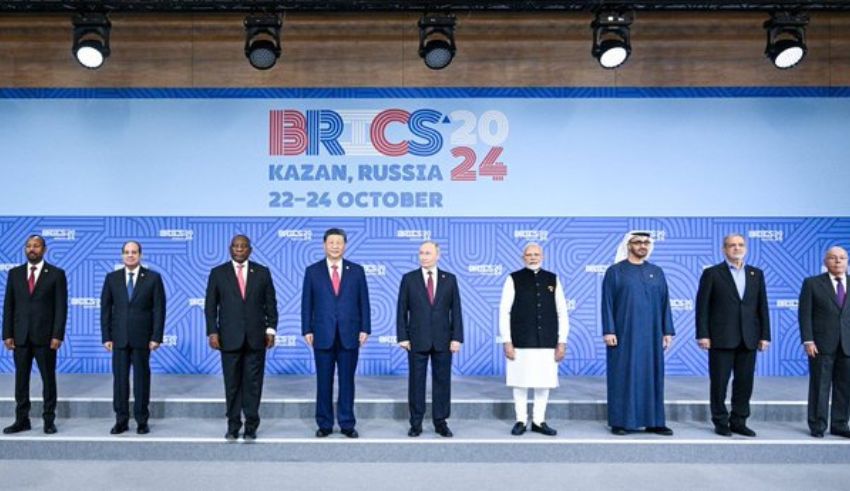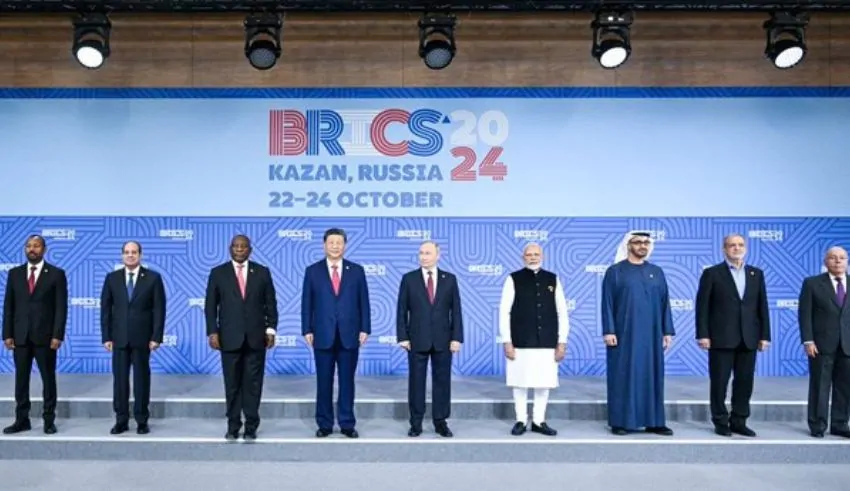

(C) BRICS
Russian President Vladimir Putin received a symbolic “BRICS banknote,” which has evolved into a major visual emblem of the continuous debates on a possible unified currency among the BRICS countries, at the summit in Kazan. The banknote was revealed alongside a larger exhibition highlighting the five BRICS nations’ combined efforts—Brazil, Russia, India, China, and South Africa—to increase economic cooperation and investigate substitutes for current world financial institutions.
Showed to Putin during the meeting, the symbolic BRICS banknote stands for the group’s united effort and mounting financial solidarity. The flags of all five founding BRICS countries are conspicuously seen on the front side of the note, signifying the solidarity and cooperation that has been progressively fostering among these rising countries. Although the note does not show actual money yet, its importance is evident: it reflects the shared wish of the BRICS countries to occupy a more prominent spot in the global financial scene.
The publication of this symbolic note captures the continuous dialogue among BRICS on establishing a single currency, not only as a ceremonial action. Particularly in view of geopolitical changes and the growing necessity of member countries to lessen their reliance on the U.S. dollar and other Western-dominated financial systems, this proposal has acquired support recently.
Leaders of the BRICS countries huddled behind closed doors at the Kazan summit in a pivotal discussion on the viability of creating a shared currency for the bloc. Although specifics of the conversations are still mostly private, the talks highlight the growing need for more financial autonomy and the possibility to question the dollar’s predominance in world commerce.
Although the concept of a single BRICS currency is not novel, it has been popular as the group keeps increasing its impact in international trade and finance. Should such a currency be effective, it may drastically change how BRICS countries trade with one another and with the rest of the globe, therefore lessening their vulnerability to changes in Western currencies and financial policies. The idea of a BRICS currency is considered as a daring move toward de-dollarization, something the group has been mostly focusing on lately.
Although a BRICS currency is still in the experimental stage, it might greatly help member countries. The goal of this project is mostly to lessen reliance on the US currency for overseas trade. Many BRICS countries today rely mostly on the dollar for commerce, hence they are subject to Western economic policies and changes. A common BRICS currency might offer a substitute, therefore stabilizing trade relationships inside the group and encouraging more equitable economic growth.
Still, there are also significant obstacles to go before a BRICS currency could take front stage. With each country having its own unique monetary policies, inflation rates, and economic situation, the five BRICS countries have somewhat different economic environments. Organizing these elements into a single monetary system would be difficult and calls for both political resolve and financial collaboration. Another difficulty is the worldwide financial system, which at present is controlled by the U.S. dollar and other Western currencies. Established financial authorities that would view a new currency as a danger to the present world order could object to its implementation.
The Kazan meeting is extremely important since it happened in line with BRICS growth. Other rising nations keen to join the club have piqued enthusiasm for it in recent years. Originally formed by Brazil, Russia, India, China, and South Africa, the BRICS bloc has grown to encompass other nations with objectives of economic development and less reliance on Western-dominated financial institutions. The possible addition of new members would only support a BRICS currency since a bigger group may boost the impact of such a currency on international markets.
Apart from reflecting the unity of the founding BRICS countries, the symbolic banknote shown at the summit suggests the possibility for more collaboration and development. Growing interest in nations across Africa, the Middle East, and other continents, the BRICS bloc may soon account for even more of the world’s GDP. This would provide the group more power in trying to advocate a common currency and challenge the supremacy of current financial institutions.
It is abundantly evident as the Kazan debates draw to an end that BRICS leaders are serious about guiding their nations onto a different financial path. Although the concept of a BRICS currency is still in its early years, the release of the symbolic banknote marks a first towards realizing this ambition. The possible benefits might be transforming not just for BRICS countries but also for the world economy if the bloc keeps cooperating and overcomes the obstacles related with such an ambitious initiative.
For now, the symbolic banknote serves as a reminder of the BRICS countries’ combined attempts to establish a more fair financial system and its increasing impact. The globe will be closely observing to see whether BRICS can realize this ambition as the debates go on and the bloc grows.
BBH Singapore has come out with a brave new campaign called ‘Rinse & Repeat’, which gives a glimpse of a…
The 78th Palme d’Or aka Cannes Film Festival will be taking place from 13 - 24 May 2025 at Palais…
OTT platforms are becoming inevitable in our routine life, because we need an off or a break which is well-spent…
With the aim of promoting one of the highly watched sports in the world which is cricket, in the East-Asia…
First time, a strategic five year initiative has been agreed between Imagica Group who are from Japan and Cannes, in…
Every household in Singapore can from 13th May 2025 receive $500 worth of Community Development Council (CDC) vouchers under the…
This website uses cookies.
Read More